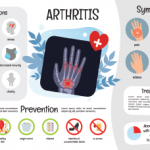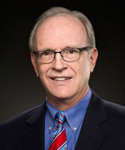Charles G. Helmick III, MD, Retires After 42 Years with the CDC
On Dec. 31, 2021, after 42 years of service, Charles (Chad) G. Helmick III, MD (Capt., USPHS, Ret.), officially retired from the Centers for Disease Control and Prevention. He joined the CDC in 1979, when Jimmy Carter was president, and served through eight administrations. His career path has been notably marked by his spearheading efforts at the CDC to provide public health evidence to encourage more focus on chronic diseases. Now enjoying the fruits of retirement, including time with grandchildren, Dr. Helmick reflects on the trajectory of his CDC career.
Dr. Helmick obtained his medical degree at Johns Hopkins University and completed a three-year residency in internal medicine at Baltimore City Hospital, after which he joined the CDC’s Epidemic Intelligence Service program. After six years spent largely in infectious disease work, Dr. Helmick realized he wanted to have a bigger impact on population health and placed his focus on chronic, disabling diseases.
The obstacles to directing funding to combat chronic diseases mostly distilled down to the reality, he recalls. “Diseases that kill people get a lot more attention.” The answer to this conundrum, in his thinking, was better documentation of the burden of arthritis and other chronic conditions. “I thought arthritis was the most ‘sellable’ because, from a public health point of view, it affects so many people and there are underused ways to manage it with physical activity and self-management education,” he recalls.
Dr. Helmick embarked on a series of studies establishing the prevalence of arthritis, projecting future prevalence and arthritis-attributable activity limitations, working with the Johnston County Osteoarthritis Project conducted by the Thurston Arthritis Research Center (TARC) at the University of North Carolina (UNC) School of Medicine, Chapel Hill. Aided by collaborations with the Arthritis Foundation and the ACR, the CDC’s Arthritis Program was created, with a funding stream, in 1999.
Since that time, the studies have expanded to include estimates of direct and indirect costs and effects on quality of life. Education efforts increased as well, with the CDC sponsoring public health messaging by state health departments and working with groups like the YMCA to adopt physical activity programs for adults with arthritis.
Dr. Helmick says obstacles remain to full adoption of physical activity programs. Here is where making the connection between diseases, obesity and hypertension could yield even more improvements in quality of life, he maintains. For example, being physically active while living with arthritis pain, which may seem counterintuitive, can help reduce arthritis pain and help in the management of obesity and hypertension.
Dr. Helmick also helped bring more focus to lupus by launching the Lupus Program in 2003, starting several lupus registries and conducting longitudinal studies of both arthritis and lupus. He has received multiple awards for his work, including the 2012 ACR Award for Public Leadership in Rheumatology and the 2016 Association of Rheumatology Professionals (ARP) President’s Award.
“It was a great run at [the] CDC, and that’s what kept me around,” he says.
Amanda S. Alexander, MD, Now Leads Rheumatology Fellowship Program at UAB
Within four years of her arrival at the University of Alabama–Birmingham (UAB) for a rheumatology fellowship, Amanda S. Alexander, MD, joined the staff as an assistant professor in the Division of Clinical Immunology and Rheumatology and also became an associate program director of the Rheumatology Fellowship Program. Last fall, she was appointed director of that program and has been implementing her goals in 2022.
When Dr. Alexander became the director, she said, “I really wanted to help fellows find their passion in rheumatology, and at the same time, help them with their individual career goals.”
She is passionate about creating an atmosphere that encourages scholarship, research, leadership and wellness to prepare fellows for their future careers. Whether a fellow is aiming for a career in clinical investigation, academics or private practice, her job is to model how to be a good leader in any of those roles—and how “to be the best physician for their patients.”
Dr. Alexander has been active with the ACR, serving as a member of the Government Affairs Committee, and in 2021 managing the Advocacy 101 program. Her involvement with advocacy stemmed from the economic disparities that patients experience in the South. Her advocacy has ranged from helping remove Medicare coverage caps for annual physical therapy allotments, to outreach with colleagues and government representatives.
The first year of the fellowship program at UAB’s Division of Rheumatology covers the same curriculum for all; in years two and three, the program is differentiated, and fellows are matched with a mentor. Dr. Alexander is eager to empower fellows to be educators—“not only to residents and medical students with whom they work, but also with their patients.”
Connecting during the pandemic created challenges, as well as opportunities, for educators, she notes. Incorporating a wellness component for fellows entailed some group outdoor activities, such as 5K runs and a Pilates class, even a visit to a nail spa. When in-person events were restricted, Dr. Alexander notes that more frequent virtual check-ins with fellows were essential.
“Burnout is a really big issue right now,” she says. Thus, as a leader she tries to model behaviors to prevent it. She often initiates conversations about wellness, talking about exercise, taking time for oneself and relaxing, and making sure that clinicians arrange for enough coverage when off duty so they can totally relax. “It’s essential to provide services and backup so that resilience is encouraged,” she adds.
Cecilia Chung, MD, MPH, Recipient of ASCPT Early Investigator Award

Dr. Chung
Last fall, Cecilia P. Chung, MD, MPH, associate professor of medicine at Vanderbilt University Medical Center (VUMC), Nashville, Tenn., received the Leon I. Goldberg Early Investigator Award from the American Society for Clinical Pharmacology & Therapeutics, in recognition of her contributions to clinical pharmacology.
Dr. Chung began her medical training in Peru and Canada, and earned a master’s in public health from Vanderbilt University. She completed her internship, medical residency and the clinical portion of her rheumatology fellowship at Johns Hopkins University, Baltimore. She then returned to Vanderbilt to complete the research portion of her fellowship, and joined the VUMC faculty as an assistant professor of medicine in 2012.
Dr. Chung’s current research, supported by R01 grants from the National Institutes of Health and a Merit Award from the Department of Veterans Affairs, is focused on the pharmacogenomics of immunosuppressants and the comparative safety of non-opioid analgesics. She is also involved in clinical research, studying cardiovascular disease and other long-term outcomes in patients with systemic lupus erythematosus and rheumatoid arthritis.
“I’ve always been puzzled by variability in drug response, and how we can explain that at the population and personal levels,” she notes. Collaboration is a mainstay of her approach to these questions, a direction she attributes to mentorship from C. Michael Stein, MBChB, the Dan May Professor and professor of medicine in the Division of Clinical Pharmacology at VUMC. It was Dr. Stein, she says, “who showed me the value of interdisciplinary research.” She considers multiple collaborations alongside colleagues in the departments of biostatistics, epidemiology, genetics, nephrology and cardiology among the most enjoyable part of her work.
Dr. Chung serves as associate editor for Clinical Pharmacology & Therapeutics and is a former member of the editorial boards of Arthritis Care & Research and Clinical Rheumatology. Dr. Chung now also serves as diversity liaison for the Division of Rheumatology at VUMC, a role that is “quite personal” for her, she says. Both at the university level and in her lab, Dr. Chung sees this role as an opportunity to “face hard questions and get some traction for the changes we need.”
Gretchen Henkel is a health and medical journalist based in California.





